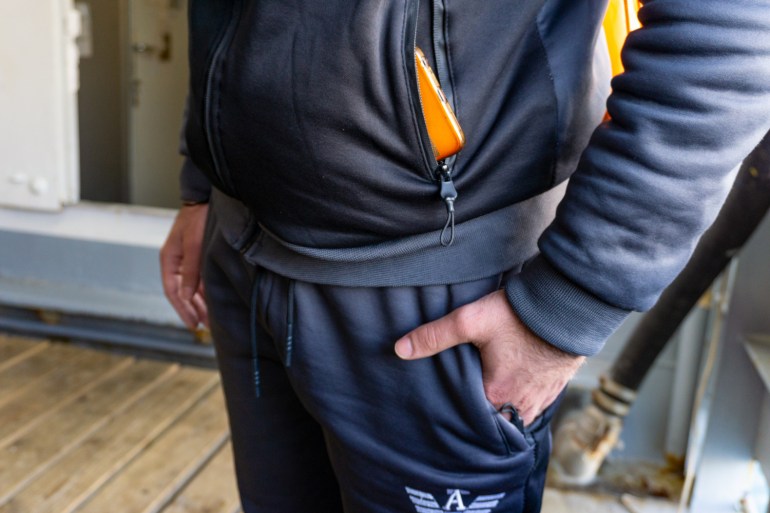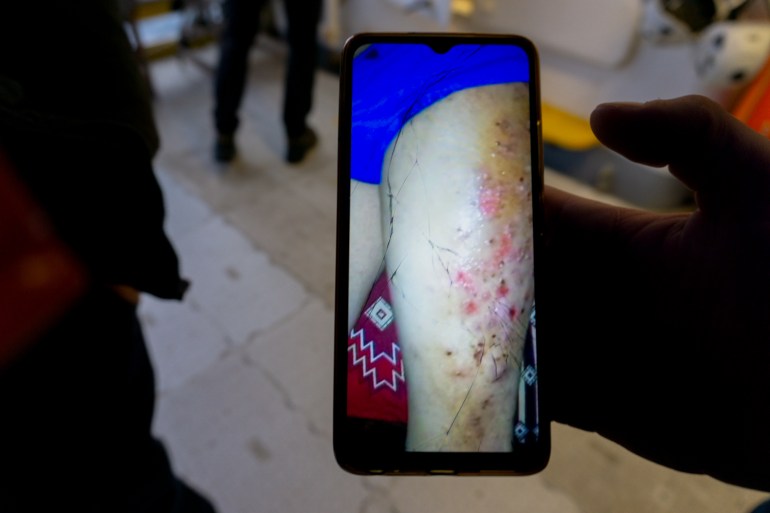ARTICLE AD
Mediterranean Sea – Malik* has been beaten, sold and humiliated along the way, but after being rescued in the middle of the Mediterranean, he hopes for a life beyond the violence.
The 23-year-old Syrian from the city of Deraa made his trip to Europe via Libya, where he became one among thousands of people detained and trafficked.
Each had their reasons for risking the dangerous journey. For Malik, a recently graduated surgical nurse, it was the choice between fulfilling his oath as a medical professional to save lives and aid humans in need, and the expectation from the Syrian government of President Bashar al-Assad that he serve in the army, with the country still at war.
“If I had stayed, I would have been at war with another human being. And not just anyone – a person from my own country. If I refused, I would have been considered a criminal,” Malik told Al Jazeera two days after being rescued at sea.
In January, Malik and 125 other refugees braving the dangerous route across the central Mediterranean, were intercepted by the German search-and-rescue vessel Humanity 1 at the break of dawn after drifting in the cold sea for two days.
Having left the port city of Sabratha on a rickety, sky-blue wooden boat, the survivors were frozen, exhausted and terrified of being sent back to Libya.
Among the survivors, Malik kept to himself; often sitting quietly and staring out at the waves as the ship made its way towards the Italian coast. Arms crossed over his chest, leaning against a dark blue bench in the ship’s clinic, he explained that it was not just the prospect of being drafted that made him leave Syria, but also that there was “no life there to create, no money, no work”.
But his trip had not gone to plan. Malik described difficulties that started upon his arrival in the Libyan city of Benghazi last May, after putting his entire family’s savings into the unreliable quest for a better life.
And what a smuggler had promised would only be a 10-day stay in Libya before departure to Italy by boat turned into more than eight months spent between detention centres, smuggling dens and hangars – places he likened to torture chambers.
“The first place in Tobruk was an animal farm, barely even that,” Malik said slowly, choosing his words with care. “There was a horse inside and the other room was for us guys. The men had long hair and uncut beards; they had been there for months.”
The 23-year-old said that he was then sold and moved around the country at least five times by different militias and gangs.
 Malik was among 126 people rescued from a boat in the Mediterranean Sea [Nora Adin Fares/Al Jazeera]
Malik was among 126 people rescued from a boat in the Mediterranean Sea [Nora Adin Fares/Al Jazeera]
Stuck in a cycle of cruelty
Four months after setting foot in Libya, Malik tried to leave for the first time. Pushed onto an overcrowded rubber boat by 11 men with guns in the dark of the night, he hoped that the journey would mark the beginning of a new life.
But 100 metres (328 feet) away from shore, the weak structure of the vessel started giving way and, along with 70 other refugees, he was forced back to land.
On three other occasions, the young Syrian tried to leave with the help of the smugglers holding him captive. But after each failed attempt, he was sold and transferred to a new location. Tobruk, Derna, Benghazi, Gazala; in each city, he encountered hundreds of other men living in disease-ridden warehouses under the violent control of armed guards.
Beatings and humiliating searches for phones became a daily activity, according to Malik. Those who were caught keeping in touch with the outside world were struck violently with stones or guns until they lost consciousness.
When trying to flee on his own, Malik ended up in the hands of a strongman in the capital Tripoli – famous for trading with Syrians specifically, he explained.
“He said we owed him $1,000 each and that we had to work our debt off. I stayed there for 17 days, working from four in the morning until we collapsed at night,” Malik said, with tasks such as construction work, cleaning houses or working on farms. Refusing was not an option.
“One of the young men I worked with was insisting on going to the bathroom, but was being denied,” Malik shook his head in disbelief as he spoke. “The man in charge of us shot him in the foot immediately as punishment. I’ve seen so much blood in Libya, more than anywhere else.”
According to Amnesty International, many refugees and migrants fleeing through Libya are subjected to repeated exploitation and forced labour by armed groups. Stuck in a vicious cycle, many rely on their relatives back home to transfer money to be released.
However, trying to pinpoint the exact number of people who might have been exploited or detained in the country is impossible.
“We hear the same story again and again from survivors, independently of each other”, Petra Krischok from the German NGO SOS Humanity told Al Jazeera.
“People are randomly detained in ‘prisons’ and forced to pay to get out, often with money they don’t have. Or exploited for work without salary,” she said.
 Jamal says he was beaten in a detention centre in Libya [Nora Adin Fares/Al Jazeera]
Jamal says he was beaten in a detention centre in Libya [Nora Adin Fares/Al Jazeera]
While Libyan authorities are claiming to crack down on the vicious industry, the country’s prime minister, Abdul Hamid Dbeibah, has appealed to the international community for further aid in tackling the issue.
During a recent visit to Italy, Dbeibah said Libya “is at war against traffickers” and that the war-torn country “invites everyone on the European side to collaborate and help us”.
Libyan authorities did not respond to Al Jazeera’s request for comment.
‘Humiliation, violence and torture’
Sitting beside Malik in silence, 28-year-old Jamal* from Damascus nodded along. The softly-spoken father of two has tried to cross the world’s most dangerous migration route by wooden boat on three different occasions. Twice, he says he was pulled back by the Libyan Coast Guard, into what he describes as hell on earth.
Since 2015, the European Union has provided financial support to the Libyan coastguard as part of its plan to reduce migration from North Africa. The Italian government, currently led by Giorgia Meloni of the far-right party Fratelli d’Italia (Brothers of Italy), has since then gifted several ships to the coastguard – ignoring the regular accusations of abuse, extortion and crimes against humanity.
In February, it was reported by the German outlet Spiegel that Frontex, the European Border and Coast Guard Agency, has shared the location of boats in distress with the Libyan coastguard more than 2,000 times over the past three years – a collaboration that may have facilitated the return of refugees and migrants to brutal detention camps.
“They [the Libyan Coast Guard] made sure our engines were detached from the boat and sank in the water. They took the little food we had left before setting fire to the fishing boat in the middle of the sea,” Jamal told Al Jazeera about his second attempt to leave Libya.
Beaten by the coastguard, robbed of the money he had left and brought back to shore, Jamal had no idea where his fate would take him. Along with 70 other men, he was shuttled to a detention centre in Bir el-Ghanam, southwest of the capital – a camp notorious among Syrians, he explained.
“Everybody fears this place. It’s known for humiliation, violence and torture – and that it’s impossible to leave once you’ve been detained.”
Some of Jamal’s words were little more than whispers; despite two days of rest on board the rescue vessel, he was still exhausted after the rough journey at sea.
He recalled the Derna hangar, about 50 by 15 metres (164 by 49 feet), where he says they were greeted with yet another humiliating beating. Four hundred other refugees and migrants were crammed inside the dirty hangar run by Libyan migration authorities. Most of them were from Egypt, Bangladesh, Pakistan and Syria.
“The humiliation never ended; they would beat us with a green water hose or wooden sticks. Some had been there for a year and a half,” he said, running his fingers through his unshaven black beard.
 Some of the refugees held in Libya got scabies from the conditions they were in [Nora Adin Fares/Al Jazeera]
Some of the refugees held in Libya got scabies from the conditions they were in [Nora Adin Fares/Al Jazeera]
‘Dying slowly because of hunger’
Many of the men in the hangar suffered from severe scabies infections, a contagious skin disease that flourishes in warm, cramped environments. Every 22 hours, they would get small portions of pasta and water to sustain them until the next day.
Jamal’s voice started to shake when he recalled one specific incident. He looked away, blinking intensely.
“We had a riot inside, it started over something silly. An elderly Syrian man smacked one of the guards, and he was dragged out to the yard where they beat him until he lost consciousness. He lost his eye, it was just a red wound in the socket where it had been.’’
Understanding the lawless conditions they were living under, Jamal knew he had to leave. But those holding him captive demanded a payment of $4,000 per person before releasing anyone – money that Jamal did not have.
“We were dying slowly because of hunger and the beatings. So, we started rioting. Every day, we would attack the guards and they would punish us by shutting down the hangar into total darkness, beating us constantly.”
After 15 days of non-stop riots, Jamal managed to borrow money from a relative and struck a deal to pay $3,000 to be released.
Despite the imminent risk of getting caught again or drowning, he was willing to gamble with his life to reach safety in Europe.
![The blue boat [Nora Adin Fares/Al Jazeera]](https://www.aljazeera.com/wp-content/uploads/2024/02/The-blue-boat1-1708686236.jpg?w=770&resize=770%2C513) The blue boat that the two men boarded with 124 other desperate people [Nora Adin Fares/Al Jazeera]
The blue boat that the two men boarded with 124 other desperate people [Nora Adin Fares/Al Jazeera]
“It’s better to die at sea than return to Libya,” he said.
Jamal and Malik are among the more than 4,400 people who have fled to Europe via the Mediterranean route in 2024 – a sharp increase compared with the same period last year.
In 2023, at least 380,000 people braved the tough journey across the Mediterranean, according to Frontex, marking the highest level of arrivals since 2016. Among those, 100,000 people came from Syria.
“Fleeing Damascus to start a life in Europe was hell itself. But trying to escape Libya turned out to be even worse,” he said, opening his hands in a gesture of resignation.
Carrying only a passport and hopes of a dignified life in Europe, Jamal explained that his journey was not over yet. He still bears the responsibility of providing for six people back home: his two children, his wife, his parents and his younger sister.
The most important thing is to bring them to safety after him, he said, marking the end of his story.
“This pain is not only mine, I share it with every Syrian. And every man who crossed through Libya. Everybody there is suffering in silence.”
Besides him, Malik raised his voice to agree. He believes that the memories of what he has seen during the past eight months will never disappear.
When asked what he hopes a life in Europe could bring, he shrugs his shoulders and smiles: “We just want to live, that’s all.”
* Names have been changed to protect the identity of the interviewees and their families.

 9 months ago
57
9 months ago
57 